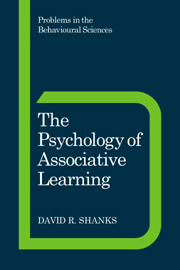2 - The rational analysis of learning
Published online by Cambridge University Press: 26 January 2010
Summary
If we take the commonsense view that the human associative learning system has evolved for adaptive purposes, then it is immediately clear that the major benefits learning affords an organism are the ability to make predictions about events in the environment and the ability to control them. If it is possible to predict that a certain event signals either impending danger such as a predator, or imminent reward such as access to food, then appropriate action can be taken to avoid the danger or extract maximum benefit from the reward. It has been common, particularly in discussions of animal conditioning, to interpret learning from the perspective of the benefit it brings the organism.
Of course, this is not to say that learning is always beneficial, and the high incidence of maladaptive behaviours, such as phobias in humans that can be traced to prior learning episodes, attests to this fact. Nevertheless, it seems plausible that such learned behaviours emerge from a system that fundamentally exists to exploit and benefit from regularities that exist in the world, whether they be signal–outcome or action–outcome regularities. For instance, when Pavlov's dogs learned to salivate to a bell that signalled food, it is likely that they benefited from the increased digestibility and hence nutritional benefit of the food. When a child learns that saying ‘juice’ reliably produces a rewarding drink, it has acquired the ability to control a small but important aspect of its environment.
In this chapter we will try to establish the degree to which human learning is appropriately adapted to the environment.
- Type
- Chapter
- Information
- The Psychology of Associative Learning , pp. 20 - 60Publisher: Cambridge University PressPrint publication year: 1995



